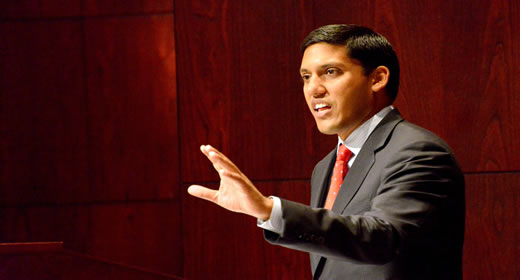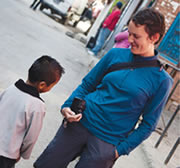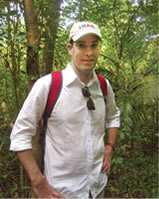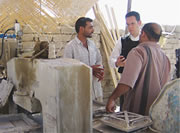
Ford School alumni 'work smart' on international development at USAID
"Just imagine the communities you came from if, within a six-week period of time, your schools had to double in capacity to take in refugees from a neighboring country," proposed Rajiv Shah (BS '95), Administrator of the U.S. Agency for International Development (USAID) at a late September talk sponsored by ONE and hosted by the Ford School, "and you get a sense of both the scale of the challenge—and the potential—for real partnership between the United States and Jordan."
Shah described how, as a result of dynamic systems modeling, USAID was able to build a sustainable infrastructure that will provide 30 percent of all water for nearly 1.7 million people in Jordan. USAID recently turned on a piping and pumping system in the country, he explained, which has absorbed 150,000 Syrian refugees fleeing the regime of Bashar Hafez al-Assad in search of safety, shelter, food and, yes, water.
"It's getting more and more important," Shah emphasized, "that we bring smarter science, smarter technology, and a smarter development practice to our work."
And smart is the key word. Innovation often is the result of working smarter to refine existing knowledge and practices and applying them within different settings. For decades now, Ford School alumni committed to international development have joined USAID, and their work is not only smart—it's having a notable impact.
 |
|
Maggie Koziol (MPP '07) on a World Bank trip to Nepal. |
"I went to USAID because the organization had renewed its commitment to the use of evidence to inform policy and programming. And that renewed focus, I think, is really important in a world that values learning, transparency, and accountability," explains Maggie Koziol (MPP '07), a policy advisor in the Office of Education.
USAID's education strategy is threefold: improving reading (particularly in the early grades), youth and workforce development, and providing equitable access to education in countries undergoing crisis and conflict.
Koziol is the point person for USAID's engagement with the Global Partnership for Education—with GPE and other donors, Koziol is developing strategic education indicators and formulating a strategy for using resultsbased financing in the education sector. She also develops policy and provides guidance to USAID staff in the field on how to use impact evaluation to improve education programming. "There has been an incredible push, I have watched it happen," she says excitedly, "this transition from just inputs and outputs to really caring about longterm outcomes and figuring out what works. And not just what works in one specific context but what works across contexts."
Particularly challenging contexts are conflict and war zones. South Sudan, which only became independent in 2011 after decades of civil war, is the newest country in the world, Koziol explains. USAID is working to create an education infrastructure where none had existed. "They had no education system—they had no systems," she says.
"We have been working in collaboration with other development organizations on strengthening their systems, creating more equitable access to education, and making certain that in a country as young and as fragile as South Sudan is, there will be generations of educated young people who will be able to sustain democratic and economic growth for the future."
 |
|
Sean Jones (MPP '00) during a USAID site visit to a forest community in Chiapas, Mexico. |
Sean Jones (MPP '00) is the deputy director of USAID's mission in Mexico and he points out that the country, categorized as upper-middle-level income, is "more developed than the locations for typical USAID missions." But Mexico's challenges, particularly security along the northern border and climate change, give USAID its purpose. Indeed, a quarter of the mission's funding helps the government and the private sector promote policies and find resources to reduce emissions by 2025. A significant portion of USAID's work in Mexico also involves justice reform and human rights for the most marginalized groups and reducing crime and violence in communities affected by narco-violence. But reform doesn't come easily. For Sean Jones and Maggie Koziol, innovation means working smarter, or cheaper, and spreading the word.
That's why Jones is pleased with the agency's recent direction, which has moved to include more organizations that traditionally might not have made it through the agency's bureaucracy.
|
|
"There's a huge push to ensure that local people and local organizations with amazing ideas, approaches, and complementary goals become a part of our USAID family," he explains, noting that more of the budget in recent months has gone to local organizations that know the culture, share the passion for solving the country's problems, and are in tune with the dynamics in the country.
In addition to the agency's normal practice of fully supporting other organizations' implementation efforts, USAID's Mexico mission also offers challenge grants, which provide seed capital to partners with good ideas that align with the agency's strategic objectives. Subsequently, those ideas can be scaled up and shared throughout the agency and the places in which they work. "In terms of innovation," says Jones, "the grants also ensure that USAID officers stay smart with all of the great things going on in the rest of the world."
Below is a formatted version of this article from State & Hill, the magazine of the Ford School. View the entire Fall 2012 State & Hill here.
 Sean Jones (MPP '00) speaks with a tile shop owner in Fallujah, Iraq, about the challenges of growing his business during times of conflict and how the Iraqi government could do more to help (2006)
Sean Jones (MPP '00) speaks with a tile shop owner in Fallujah, Iraq, about the challenges of growing his business during times of conflict and how the Iraqi government could do more to help (2006)